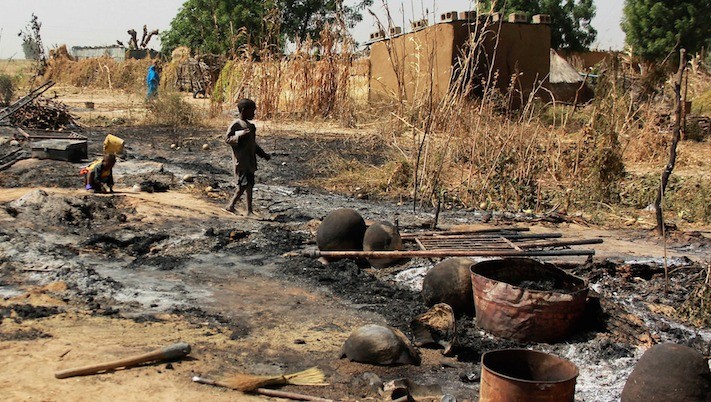…Tinubu postpones trips
President Bola Tinubu’s ambitious economic reforms are coming under renewed strain as a wave of violent attacks and mass abductions deepens insecurity across Nigeria, threatening to erode investor confidence in Africa’s biggest oil producer.
Tinubu’s government entered office confronting Nigeria’s worst economic crisis in decades. He removed fuel subsidies, restructured the foreign-exchange (FX) market, and began overhauling the tax and public finance systems. International lenders welcomed the reforms, and multinationals began quietly exploring renewed investments.
But rising insecurity is threatening to blunt those early gains.
The latest flashpoint emerged on November 17, when armed men stormed a girls’ secondary school in Kebbi State in northwest Nigeria, abducting 25 students, killing a staff member and injuring another.
No group has claimed responsibility, but the attack bears the hallmarks of the mass kidnappings that have plagued Nigeria’s north for more than a decade. It also revived painful memories of the 2014 Chibok abductions, which shocked the world and triggered global calls for reform.
The attack is one of several violent incidents that have erupted in quick succession, compounding an already fragile security climate. Days earlier, terrorists linked to Islamic State West Africa Province (ISWAP) killed a brigadier-general and several army personnel in the North-East.
In Kwara State, gunmen stormed a branch of the Christ Apostolic Church in Eruku town, killing three worshippers and abducting the pastor and others.
Read also: Bandits attack Kwara church, kill three and abduct worshippers during livestream
The surge in violence comes as Tinubu pushes ahead with sweeping measures meant to revive economic growth, attract foreign investment and repair the fiscal damage of years of subsidy distortions and oil revenue leakages.
“Nigeria’s long-running security challenges have brought obvious human costs, and they have also contributed to the economy’s woes by hurting output in the agriculture and oil sectors, weakening demand, and putting off investment,” David Omojomolo, Africa economist with London-based Capital Economics, said in a note.
He added, “President Tinubu’s revamping of security leadership and extra money should eventually help, but we suspect that there will be only limited progress before the 2027 election.”
Funso Doherty, co-founding trustee of the Chartered Financial Analyst (CFA) Society Nigeria and former Lagos governorship candidate, said the country can no longer afford half-measures.
“Again, we hear tragic news of cruel and brazen attacks on helpless communities of Nigerians like us in Kebbi and Kwara,” Doherty said. “As we reach out in love to those affected, we say enough is enough. This must stop. The case for State Policing has never been stronger. Now is the time to act.”
Oluseun Onigbinde, co-founder and director of BudgIT, said the severity of the crisis requires the government to rethink both its strategy and its personnel.
“We should seek help, if necessary,” Onigbinde said in an interview. “The President also needs a holistic social protection plan, as current economic efforts exacerbate hardship at the micro-level. Also, we need an audit of our military hardware. We are not where we should be.”
Onigbinde urged Tinubu to adopt a more data-driven, coordinated and decentralised security framework.
Attacks on education
Nigeria’s education sector has been among the hardest hit. As of September 2025, at least 589 schools were closed due to insecurity, according to state and federal education authorities. A 2024 report also found that at least 1,680 students were abducted between 2014 and 2022, a number that has likely climbed in the years as armed groups increasingly target schools for ransom.
Read also: FG rejects characterisation of insecurity as genocide against Christians
The United Nations has repeatedly warned that school closures risk deepening Nigeria’s learning crisis, with millions of children in the North already out of the classroom due to poverty, cultural barriers and the lingering effects of insurgency.
“These attacks are not just security incidents; they are generational tragedies,” said a senior official with an international education non-governmental organisation (NGO) who requested anonymity because of safety concerns. “Every school closed represents hundreds of futures disrupted, and that has long-term economic consequences.”
The attacks have ignited political backlash.
On Wednesday, Peter Obi, former presidential candidate, criticised Nigeria’s political class for focusing on partisan disputes while security deteriorates.
In a post on X formally known as Twitter, Obi referenced a recent remark by U.S. President Donald Trump describing Nigeria as ‘now disgraced.’
“Within a single week, 25 people were kidnapped, and one of our generals along with other officers was killed,” Obi said. “Rather than uniting in this critical moment, we are consumed by internal wrangling, party squabbles and distractions.”
Tinubu postpones trips
Reacting to the development, the president was scheduled to travel to Johannesburg for the G20 Summit before continuing to Luanda for the 7th AU–EU Summit. Instead, he abruptly postponed both trips, citing the attacks in Kebbi and Kwara.
“Disturbed by the security breaches in Kebbi State and Tuesday’s attack by bandits against worshippers at Christ Apostolic Church, Eruku, President Tinubu decided to suspend his departure,” Bayo Onanuga, special adviser on information and strategy to President Bola Tinubu, said on Wednesday.
“He now awaits reports from Vice President Kashim Shettima, who paid a sympathy visit to Kebbi on his behalf, as well as reports from the police and the Department of State Services regarding the attack in Kwara,” Onanuga added.

